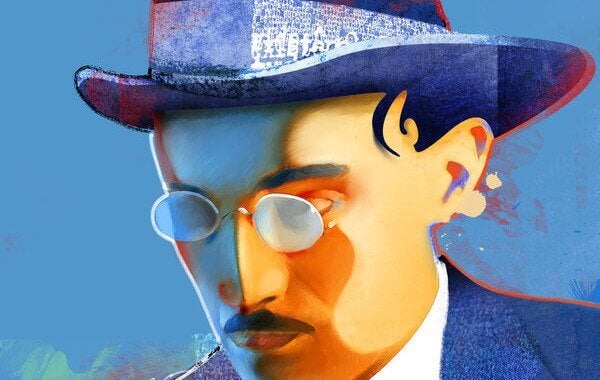Discover some phrases of Fernando Pessoa, one of the greatest poets of all time, born in Portugal and lived between the late nineteenth and early twentieth centuries, for some he is one of the most enigmatic figures in literature. For others, a sorcerer who immersed himself in the depths of the human soul and left behind many intelligent verses and wisdom.
One of the most mysterious aspects of Pessoa was his obsession with using heteronimos: fictional characters who appeared as authors of his work, among which are Alberto Caeiro, Alvaro de Campos, Bernardo Soares and Ricardo Reis, he himself has published criticisms against the alleged authors, when in fact he referred to his own works.
- “I think saying something means preserving one’s virtue and taking it out of terror.
- The fields are greener in the imagination than in their greenery.
- Flowers.
- If described by phrases that define the air of imagination.
- Will have colors of a permanence that cellular Life does not allow?.
- – Fernando Pessoa-.
The most interesting thing is that these heteronimos were not only pseudonyms or signatures, each of these personalities had their own characteristics and style, some specialists in his work also sometimes wonder if Fernando Pessoa was his true identity, anyway he left an extraordinary job. Then seven sentences by Fernando Pessoa that invite us to think.
Fernando Pessoa’s work and phrases are very close to philosophy, his reflections are journeys through the logic of existence, in this sentence, for example, he demonstrates the paradox of thinking and not thinking: “The consciousness of the unconsciousness of the life is the oldest tax that weighs on intelligence ”.
This phrase impacts because it demonstrates a fundamental contradiction, it is through intelligence and consciousness that we perceive the existence of unconsciousness, unconsciousness is inaccessible because it is unconscious and, as such, does not have full access to reason, so we only know what we do not know.
The gaze defines identity and, at the same time, identity defines the gaze. That’s why the two realities are always together. This is reflected in one of his wonderful phrases: “Because I am the size of what I see and not the size of my waist. “
This means that the wider the gaze, the more the person looks, and the opposite is also true: those who have a short field of view are invaded by smallness, height, figuratively, defines how to see reality.
Fernando Pessoa fought and thought. It frees and imprisons: it gives the joy of understanding, but at the same time removes the freshness of life, as the poet acknowledges in this sentence: “Not knowing anything about oneself is living. Learn a lot from yourself, don’t you. “
What he wants to tell us is that real life is lived simply, it is fullness. On the other hand, thinking is a limited exercise, leading only to partial results and depriving us of fully feeling our existence. Life is stronger than you think.
Fernando Pessoa defines love as a construction of thought, something imaginary. This is demonstrated by his phrase: “We never love anyone: we only love the idea we have of someone. Is that what we like about one of our concepts, that is, loving each other?
In the end, he claims that love is a selfish projection, we see in each other what we want or need to see, their reality escapes us and we will never know exactly what it is like, we simply define it and fall in love with this idea.
For Pessoa, every individual is an infinite reality. There is no possibility to build valid generalizations for each. So in one of his writings he said, “There are no rules. Are all men an exception to a rule that doesn’t exist?
The denial of a common standard for human beings means an exaltation of individual peculiarity, although it seems that we share common characteristics, each person is a different and unique world, in that sense there is no way to create a rule that can be applied to all.
For this famous Portuguese poet, success is built: “Success lies in success without the ability to succeed. Any great land is capable of house a palace, but where will the palace be if it is not built there?”??
With this wonderful phrase, Fernando Pessoa ignores the concept of talent as potential, it is not your virtues or abilities that define your talent, it is your work that determines your skills.
On death, Pessoa states: “To me, when I see a dead man, death seems like a game to me. The corpse gives me the impression of an abandoned outfit. Someone who’s gone and doesn’t need the outfit he was wearing anymore. his life. ?
This beautiful phrase speaks of the body as the facade of who we are, in death no one is more present. What the person is is not represented in the corpse, the one who died is simply no longer there.
Whoever reads the works and phrases of Fernando Pessoa will never forget him, in them they are mixed with an exceptional sensitivity and an admirable lucidity. In his verses and texts there are wonderful revelations that really move us.

